Talab Inca: The Song of the Mountains
Reading Time: 10 min
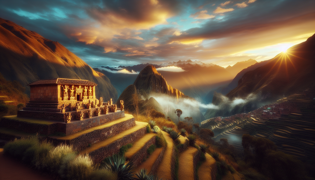
About Story: Talab Inca: The Song of the Mountains is a Myth from set in the Ancient. This Poetic tale explores themes of Wisdom and is suitable for All Ages. It offers Cultural insights. A mystical journey through the dawn of the Andes that reveals the origins of an empire.
Introduction
Dawn broke like a promise across the spine of the Andes, painting each peak in roseate hues. The ridges sighed under the first breath of daylight, as though they had waited a thousand winters for this single moment. A lone condor wheeled in the east, its wings a living tapestry woven from clouds and wind. At that instant, Viracocha, the Great Weaver, stirred against the cold of eternity. He traced the sky with fingered clouds, and from each curl of vapour, a star fell to earth. Thus the first rivers began, trickling like whispered secrets, and the valleys filled with hope.
At the heart of that newborn realm stood a solitary rock, as ancient as time itself. From its fissures sprang grasses that glimmered like emerald fireflies under silver dew. A faint aroma of wet stone rose on the air—mineral sharpness mingling with the sweetness of maidenhair ferns. Far below, a distant llama herd stirred the silence with plaintive cries, their breath visible in the chill. Around that rock coalesced Viracocha’s thoughts until a figure took shape: a maiden with hair like woven night and eyes bright as the midday sun. This was Atoq, the first priestess of the Inca line, chosen to listen to the mountain spirits.
Atoq knelt upon the damp earth and offered the Incan code: Ama sua, ama llulla, ama qhilla—“Do not steal, lie or be lazy.” Her voice was gentle yet inexorable, as a glacier carving stone. She placed her palm upon the rock. It thrummed under her touch, warm as a heartbeat. A single feather drifted down, drifting on a breath of wind, and Viracocha’s whisper filled the hollow: Here rests the seed of empire. Now rise and sing your talab, the song of the mountains, and let the world come alive.
I. The Weaver of Dawn
Viracocha, draped in robes spun from sunlight and cloud, strode along the mountain spine like a dream made flesh. Each step he took left a trail of flickering stars that vanished before morning’s touch. The peaks hummed in anticipation, their rocky faces etched with the memory of his footsteps. He paused at the summit of Inti Q’acha, the Sun’s Mirror, where a crystalline pool lay perfectly still. In its depths lay the reflection of eternity, as if the sky had fallen to earth in a single breath.
The wind brought whispers from the Puna grasslands: the rustle of highland grasses, the distant drum of condor wings, and the murmur of unseen spirits. Viracocha dipped his hand into the pool. The water welled up in droplets like molten silver, each bead a foretold future. He closed his eyes and listened to their silent rhyme. From that chorus emerged the first melody of the world, a haunting cadence that rang through canyon and cloud.
He sang of the stone-hewn terraces, ancestors carved into living earth. He sang of the llama caravans, laden with maize and coca leaves, winding like living rivers along steep trails. A faint tang of coca smoke lingered in the air—a resinous sweetness that clung to the tongue. In that moment, the mountain itself responded, shifting imperceptibly underfoot, as though the Andes rose to meet their maker.
Lo, the sky deepened to amber, and the first llamas emerged upon the distant ridges, their brown coats shimmering like burnished bronze. The melody swelled into a gust of wind that carried seeds of corn and quinoa across the peaks. Fields sprang to life in a riot of green and gold. Viracocha’s voice dissolved into echo, leaving behind a world newly born. He smiled, for the Weaver had spun the dawn and set the stage for humankind.
As the final notes drifted away, Atoq appeared at the pool’s edge. Her dark hair streamed like a banner in the breeze. She bowed, and Viracocha entrusted her with the sacred melody: the Talab Inca. “Guard it well,” he intoned, “for through music and memory, the spirit of the mountains shall endure.” He vanished in a shimmer of dawn light, and Atoq stood alone, cradling the song that would shape an empire.
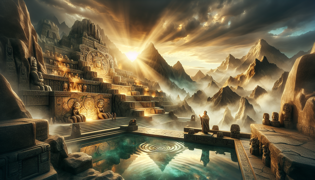
II. Teachings of the First Priestess
With the dawn-song secured, Atoq descended the terraces like a dark comet threading through fields of maize. Each step carried the weight of destiny, her feet bare against the cool stone. She paused to touch the polished walls of the Qorikancha precinct, so named the Golden Enclosure, where idols of the sun and moon stood in silent witness. The air inside smelled of roasted corn and beeswax candles—sticky sweetness tempered by smoky warmth. Candles flickered in carved niches, casting wavering shadows that danced like spirits at a feast.
Atoq gathered the people in the central courtyard, their faces uplifted in wonder under the high white walls. She began by teaching the sacred code: “Ama sua, ama llulla, ama qhilla.” The words rolled from her tongue like river-worn pebbles, simple yet unbreakable. A hush fell, broken only by the distant susurrus of mountain breezes. That breeze carried a chill of condensation; it tasted faintly of granite and evergreen resin.
She spoke of reciprocation with the earth: the sacrifice of llamas at high passes, the offerings of maize dough moulded into celestial shapes. She rehearsed the prayer for Pachamama, the Earth Mother, to embrace the harvest. Each invocation glowed with reverence, as if the very syllables held warming embers. Around her, the elders nodded, their silver hair like frost upon steep slopes.
In a courtyard corner, a young boy named Chaska fiddled with a carved flute. His melodies rose uncertainly, then merged with Atoq’s recitations in a tender duet. The sound was as delicate as dewdrops upon a spider’s web. She smiled, for in his breath lived the next generation of mystics. The stone beneath them seemed to murmur in approval, faint rumblings that echoed through hollow corridors.
By nightfall, torches glowed like captive stars along the narrow avenues. Atoq retired to the inner sanctum, where walls were inlaid with lapis lazuli and cinnabar. The stones hummed with latent power, their textures cool as obsidian. In the flicker of torchlight, she inscribed the dawn-song onto a golden disc. From her fingertips trickled molten light, and she whispered a final blessing: “Guard this melody as you would your own heart.”
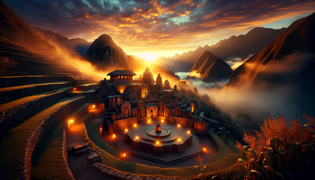
III. The Condor’s Trial
Chaska, now on the cusp of manhood, bore the weight of expectation like a mountain against the sky. He was chosen to carry the golden disc to the summit of Ausangate, where the condor king reigned. The path wound through forests of polylepis and ichu grass, each step steep and treacherous. The air grew thin, tasting faintly of cloud and pine resin. Beneath his sandals, the path’s gravel grated like distant thunder.
At midday, the sun burned hot as a forge, and Chaska paused at a shrine carved into veined marble. There he offered coca leaves, arranged in delicate rosettes. A gust of wind swept in from the east, carrying the scent of distant glaciers. He folded his hands in prayer, recalling Atoq’s words: Do not steal, lie or be lazy. The code passed through him like a mantra, steadying his heart.
As he climbed higher, the world narrowed to rock and sky. The condors circled above, their shadows drifting across ice-clad ridges. Chaska felt their gaze as an ember of challenge. Each wingbeat was a summons to courage. He pressed on, the golden disc cradled against his chest, its light flickering in rhythm with his pulse.
Night fell sudden as ink spilled across the sky. Stars gleamed like cosmic seeds, and a razor-sharp cold seeped through his garments. He lit a small fire, its crackle the only sound in that vast solitude. The warmth tasted of pine needles and burnt charcoal. He wrapped his cloak tighter and gazed upward, where a lone condor alighted upon a ledge. Its feathers were as black as mountain shadow, and its eye glowed with ancient knowledge.
The bird ruffled its wings and spoke in a voice older than rock: “Show me your heart’s true rhythm.” Chaska placed the disc upon the earth and began to sing the dawn-song, each note trembling like a leaf in high wind. The melody wove through night and stone until the condor bowed, shedding a single feather that drifted on a breath of night air. It marked his passage. The trial was passed, and Chaska awoke at sunrise cradling the feather like a promise.
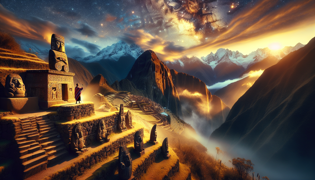
IV. Ascent of the Sun
Atop the final terrace of Tahuantinsuyo, the empire’s four quarters, the people gathered beneath a sky aflame with sunrise. The city’s stone blocks fit so tightly that not even a blade of grass could slip between. The scent of toasted quinoa and hummingbird nectar filled the plaza, mingling with the metallic tang of incense. A thousand torches flickered like captured stars, casting lantern-lit patterns across sculpted walls.
Atoq and Chaska stood at the centre of the spiral staircase that led to the Inti temple. The golden disc rested on an obsidian pedestal, and around it coiled serpentine carvings symbolising time itself. Chaska felt the weight of all generations in that moment, as though each heartbeat of the past beat within his chest. He handed the feather to Atoq, who placed it beside the disc, its barbs glinting in morning light.
Together they recited the dawn-song, their voices rising in unison. The crowd joined, a wave of sound surging up the terraces. It was like a thousand rivers converging at a single delta, each voice a tributary. Stone walls sang back with resonant echo, and the sky itself seemed to pulse with life. A hush fell as the final note dissolved into golden air.
Viracocha’s presence suffused the temple: a warmth that flooded the heart rather than the skin. A trembling light emerged from the disc, coalescing into a stream of pure dawn. It spiralled upward, piercing the temple roof and painting the sky in ambers and rose. From that burst of radiance grew new crops, firm and golden—maize as tall as trees, potatoes the size of boulders. The people wept tears of joy, tasting the future on their lips.
The emperor raised his scepter carved from meteorite iron and proclaimed a new era. Henceforth, the Talab Inca would bind the empire with harmony and reverence for earth and sky. And high above, the condors wheeled like guardians, their wings spanning the expanse of a kingdom born of song.
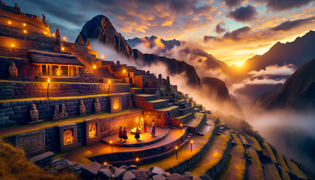
Conclusion
The echo of the Talab Inca endures beyond stone and time. In every whispering breeze through terraced fields, one hears the faint refrain of that first melody. When the moonlight glints upon Andean peaks, it recalls the crystalline pool at Inti Q’acha and Viracocha’s starry footsteps. The golden disc may lie buried beneath layers of earth, yet its light persists in the hearts of those who honour the code: Ama sua, ama llulla, ama qhilla. The empire that rose on music and memory faded like mist, but its soul remains woven into every cobbled path and every song of the condor. For in the end, the greatest temple of all is the living world itself—the mountains, the valleys, the sky—and the wisdom that binds them in song.

















